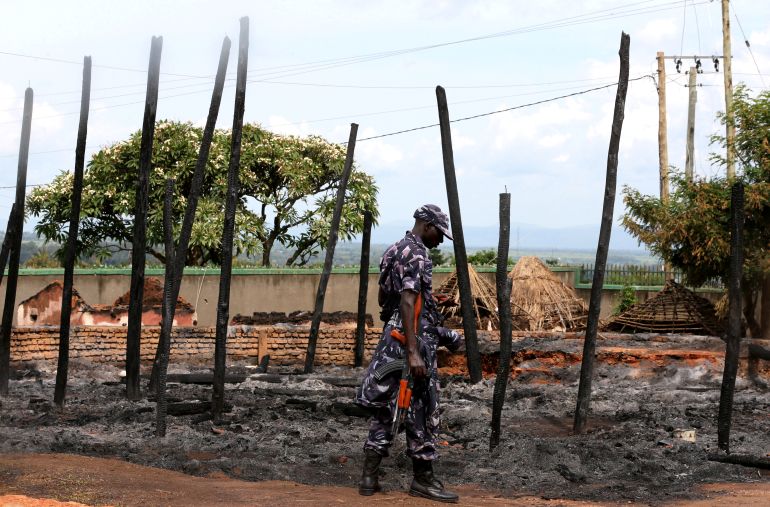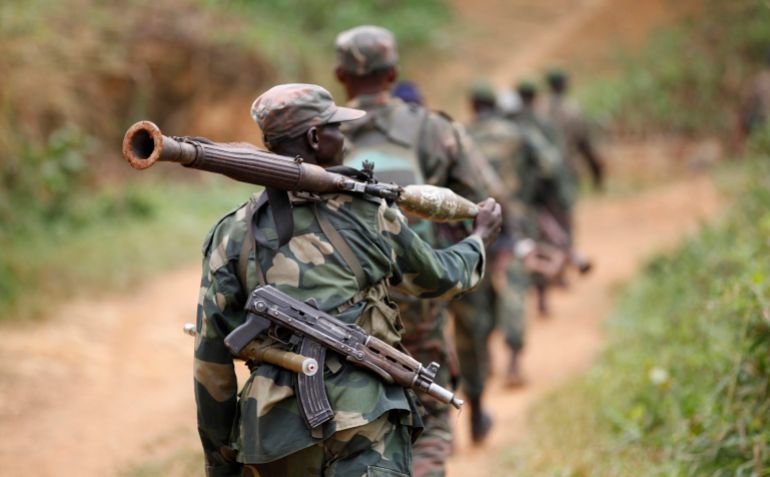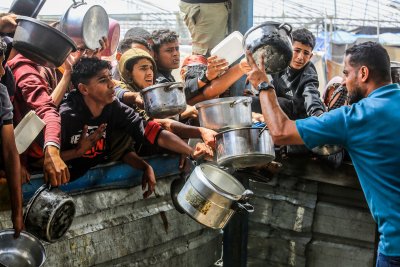Are commercial interests driving Uganda’s military operations in DR Congo? | Conflict News
Kampala, Uganda – It was June 5 when Ugandan soldiers arrived in Kasenyi, a town on the shores of Lake Albert in Ituri province in eastern Democratic Republic of the Congo (DRC).
Uganda’s army chief, General Muhoozi Kainerugaba, posted a video on X showing what he said were residents “enthusiastically” welcoming the soldiers, as Chris Magezi, an aide to Kainerugaba and at the time acting spokesperson for Uganda’s People’s Defence Forces (UPDF) said the army had “occupied” it together with another Congolese town, Tchomia.
When Kampala first deployed troops to eastern DRC in November 2021, they were in pursuit of the Allied Democratic Forces (ADF), a rebel group with Ugandan roots whose strongholds were located in Beni territory, in DRC’s North Kivu province. The group initially fought against the Ugandan government in pursuit of regime change, but from the 2010s onwards, it began aligning itself with the Islamic State Central Africa Province. In Uganda, the government accused the ADF of being behind several high-profile assassinations, while both countries blamed it for massacring civilians.
In 2021, during that first joint military operation between the Ugandan and Congolese armies, towns like Kasenyi remained unaffected.
But today, the Ugandan army’s footprint has expanded well beyond its original mission and into Ituri, by its own admission. This is despite the fact that the ADF, which has since dispersed and relocated far from its traditional bases, is not active in Kasenyi or other areas where the military has recently been operating, observers note.
In a statement in February, General Kainerugaba declared that Uganda would secure the entire border it shares with DRC: “That is our sphere of influence. Nothing will happen there without our permission,” he said on X.
On social media, Kainerugaba has frequently inserted himself into conversations about internal conflicts and the regional dynamics of the Congolese crisis.
He has openly expressed support for the M23 rebel group that has made rapid advancements in eastern DRC this year, seizing control of the capital cities of both North and South Kivu provinces.
M23 is reportedly backed by Rwanda and Uganda, according to various United Nations reports, though both countries have denied these allegations.

Economic interests
The expansion of the Ugandan army’s area of operation reflects Kampala’s shifting priorities in eastern DRC, according to army spokesperson Felix Kulayigye. He said the army is protecting Congolese communities as well as Uganda’s economic interests in the neighbouring country.
“Who is consuming Uganda’s products? Can commerce take place where there is instability? If we have commercial interests in eastern DRC, are those protectable or not?” Kulayigye told Al Jazeera.
From the start, Uganda’s military presence in DRC has carried an economic subtext.
According to a 2023 report by Deutsche Welle, as part of the agreement with the Kinshasa government to combat the ADF, Uganda was granted permission to build tarmac roads connecting key towns in DRC – routes designed to boost the movement of goods and deepen Uganda’s trade footprint in the region.
Although the text of the agreement was not released to the public, Ugandan soldiers, military equipment and road construction equipment entered all entered DRC in November 2021.
Solomon Asiimwe, an international relations lecturer at Nkumba University in Kampala, says although Uganda’s pursuit of the ADF may have appeared to be security-driven, the overriding factor was economic, though this was “hidden under the carpet”.
While some Congolese may be angered by Uganda’s expanded deployment, he suggests they should also consider the benefit of a steady supply of goods from Uganda. “Even Congolese have interests in supplying minerals to Uganda; they benefit from infrastructure and peace,” he said.
Eastern DRC’s market has become a battleground of its own. A recent analysis by The East African valued regional exports to the DRC at $2.9bn over nearly three years, with Uganda commanding a 68 percent share. Kenyan financial institutions have also staked their claim, entering DRC through bank acquisitions and the market was highly profitable – until M23’s advance this year halted their expansion.
But this trade has a dark side. Over the years, analysts and UN reports have accused both Uganda and Rwanda of acting as conduits for smuggled Congolese minerals and agricultural products such as cocoa and coffee. The International Court of Justice in 2022 ordered Uganda to pay the DRC $325m in reparations for the illegal exploitation of natural resources during its military presence in eastern DRC between 1998 and 2003; Kampala has paid several instalments since.
Analysts argue that mineral exploitation is visible in export data of these countries: for instance, Uganda’s gold exports reached $3bn in 2024, despite the country lacking any significant large-scale gold deposits.

‘Violation of Congolese sovereignty’
Ugandan army spokesperson Kulayigye said his country’s expanded deployment in Ituri was requested by Congolese authorities seeking help in fighting other armed groups destabilising the province.
“We had an additional mission at the request of Congolese authorities to deal with negative elements within Ituri,” he said.
Al Jazeera reached out to Congolese government spokesperson Patrick Muyaya to respond to this claim, but he did not reply to our questions at the time of publication.
Meanwhile, Congolese experts were sceptical, questioning both the legality and legitimacy of Uganda’s expanded mission.
“Uganda doesn’t have an agreement with the Congolese army to be in some parts of Ituri,” said Reagan Miviri, a conflict researcher at Ebuteli, a Kinshasa-based think tank. “They entered Congolese soil without permission. This is a violation of Congolese sovereignty.”
According to Miviri, Kinshasa has been silent on Uganda’s expanded operation, not because of approval but because it doesn’t want to have to confront both Uganda and Rwanda at the same time.
But he admits that in many areas where Uganda has deployed, it has more presence than the Congolese army.
Kambale Musavuli, a Congolese political analyst, calls Uganda’s growing military presence an occupation – one that “should alarm every Congolese and African who believes in sovereignty and territorial integrity”.
In response to criticism from analysts, Kulayigye said he was “disappointed by intellectuals” who sit in comfort talking about nothing, while on the ground, “people are dying at the hands of militias”.
Reminders of Congo wars
For Congolese observers, Uganda’s behaviour follows a historical script. From 1996 to 2003, Uganda and Rwanda intervened heavily in DRC, initially backing the rebel group that overthrew longtime dictator Mobutu Sese Seko and installed Laurent Kabila – only to later turn against him. Both countries subsequently supported various rebel factions attempting to oust Kabila.
Though international pressure forced Uganda and Rwanda to formally withdraw at the beginning of the century, both nations maintained ties to rebel groups, including M23, which was born out of the unresolved issues of the 1990s Congo wars.
In January and February this year, M23 captured key cities including Goma and Bukavu in eastern DRC, which they still hold. The UN accused Rwanda of deploying up to 4,000 Rwandan soldiers in the DRC, which helped rebels capture the cities, while Uganda has been accused of allowing M23 to get supplies and recruits through its territory.
“It’s a continuation of a pattern we have seen for decades, where neighbouring countries exploit instability in eastern Congo to pursue military and economic interests under the guise of security operations,” said Musavuli.
In the aftermath of the Congo wars, several reports emerged, including from the UN, that Rwanda and Uganda were targeting Hutu civilians and looting and smuggling resources like coffee, diamonds, timber and coltan from the DRC.
Josaphat Musamba, a Congolese researcher at Ghent University in Belgium, sees direct links between today’s conflicts and the wars of the 1990s in a cast of characters that remains strikingly familiar: Uganda’s President Yoweri Museveni, Rwanda’s President Paul Kagame and former Congolese President Joseph Kabila – who is now based in Goma, an area under M23 control – were key players in those earlier conflicts.
“If you look at [today’s M23] commanders, you can connect them to those who were fighting in the First Congo War,” Musamba said. “All of them were working with Rwandan officers like James Kabarebe. I know two or three commanders of M23, and one of them was part of James Kabarebe’s bodyguard,” he claimed.
Kabarebe, now Rwanda’s state minister for regional integration, was a central figure in the rebellion that toppled Mobutu. He later served as army chief of staff under Laurent Kabila, the former Congolese leader and father of Joseph Kabila. Kabarebe was sanctioned by the US government for being “central to Rwanda’s support for the March 23 [M23]”.
Researchers also note that after M23’s first rebellion in the DRC failed in 2012-2013, many rebels fled across the borders to Rwanda and Uganda.
Congolese researchers say that while Kampala and Kigali may claim to be addressing security threats and rebel groups in eastern DRC – like ADF and the Democratic Forces for the Liberation of Rwanda (FDLR), whose remnants were linked to the 1994 genocide in Rwanda – they are effectively carving out zones of control and economic exploitation in eastern DRC, just as they did in the 1990s.
The Congolese people, meanwhile, remain displaced, impoverished and without security. The UN said in April that renewed fighting with M23 this year had displaced nearly four million people in North and South Kivu alone.
“I don’t believe that Uganda [soldiers] have good intentions, especially in the operation in Ituri,” said Miviri. “I don’t understand why they are there.”



